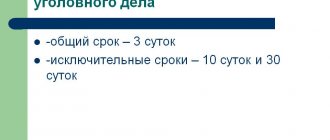Multi-channel free hotline Legal advice on criminal law. Every day from 9.00 to 21.00
Moscow and region: +7 (495) 662-44-36
St. Petersburg: +7 (812) 449-43-40
Signs of a crime, responsibility
There are significant differences between crime and ordinary everyday slander and insult.
In order for words to take the form of a criminal offense, the following conditions are necessary:
- defamatory words were communicated to at least one third party;
- the information disseminated is deliberately false;
- destroys a person’s dignity and honor, destroys his reputation.
The law also introduced other special characteristics, which in professional legal language are called qualifying. They increase the severity of the slanderer's guilt and the degree of punishment.
For example, the fine increases from five hundred thousand to five million rubles when spreading a deliberate lie:
- during a public speech;
- through the media;
- using the advantages of the position;
- about committing a serious offense, including sexual offence;
- about a disease that is dangerous to others.
Persons from the age of sixteen are held accountable. But young lampooners, especially those active on the Internet, should not rely on their young age. The harm caused by their actions will be compensated by legal representatives - the parents - through a civil suit.
In addition, the latter will have to answer under Article 5.35. Code of Administrative Offenses of the Russian Federation for failure to fulfill obligations to educate minors.
Sanctions by law
The minimum fine for libel is 500,000 rubles. An alternative to such payments is the equivalent of the defendant’s earnings for six months or 160 hours of community labor.
If such speeches were of a public nature, the amount of the fine increases to 1,000,000 rubles or confiscation of the income of the guilty person for the past year. Correctional work in this case is extended to 240 hours.
If it is not possible to independently reach mutual understanding, the court puts an end to the dispute between the parties
In circumstances where the source of false information is the employee’s manager, who used his official position to spread gossip, the fine increases to 2,000,000 rubles.
Another penalty in this case is community service for 360 hours or transfer of earnings for the last 2 years to the state.
Attention ! Slander aimed at distorting information about the illness of the victim of rumors is fraught with sanctions of up to 3,000,000 rubles.
In such circumstances, the court takes into account that the injured person was attributed to a disease dangerous to society, from which he does not suffer. If the gossip is aimed at accusing the employee of committing a criminal violation, the punishment involves the maximum measure. Here the defendant pays up to 4,000,000 rubles to the treasury or spends up to 480 hours on public works.
What to do for the victim
If a person believes that he has been slandered, then, discarding unnecessary emotions, you need to do the following:
- objectively assess whether the slander was an act of everyday rudeness, elementary social promiscuity, or contained signs of a crime;
- decide to exercise your right to protection of dignity, reputation and honor;
- try to preserve evidence of slander;
- compile a list of objective evidence that refute the lie;
- contact law enforcement agencies and write a statement, indicating a list of all evidence.
The corpus delicti contains many evaluative concepts that the investigator and the judge can interpret in different ways, so the help of a lawyer specializing in this category of cases will significantly increase the chances of victory.
Deliberate decision making
The decision must be made personally by the victim, since the act relates to cases of private prosecution. Exceptional options are provided when interests are represented by legal representatives. It is important to separate the emotional side of the dispute from the objective.
Wherein:
- the conflict can be ended by reconciliation of the parties;
- the victim has the right to withdraw the complaint.
It is recommended to assess the possibilities of reconciliation in advance and resort to the help of law enforcement in those circumstances when voluntary resolution of the conflict is impossible.
For certain reasons, it is possible for the prosecutor to initiate a case without the direct appeal of the slandered person. This is permitted when spreading slander against a person who, for one reason or another, is unable to independently defend his rights or against a representative of a government body.
How to record a fact
The act of disseminating defamatory false information may be one-time or repeated. Often the slanderers “backtrack”: they remove their libels, for example, from the World Wide Web, but at the same time the untruth has already been accepted by a circle of third parties.
Therefore, it is important to record acts of slanderous attacks:
- Copy a screenshot of the relevant Internet page. It is better to do this in the office of a notary, who will endorse its authenticity. Notarized evidence will be accepted by the investigation and the court without any problems.
- Take on a photo or video camera the act of disseminating defamatory information (posters, inscriptions, public speeches). It is important that the location of recording is “linked”, that is, the image contains characteristic objects by which the shooting area can be reliably identified or the detection function is turned on locations. The fixation time must be specified. As a rule, this is done automatically by a modern camera. A public speech can be recorded on a voice recorder.
- Save paper copies of disseminated fables: newspapers, leaflets, posters, etc.
- Enlist the support of witnesses who are ready to confirm the fact of an oral lie and testify to the investigator or judge.
The work done will not allow the attacker to avoid prosecution.
How to refute lies and confirm moral suffering
Emotional theses have no weight in the investigation; in order to prove that the information is false, it is necessary to provide objective counterarguments.
They may be:
- If accused of committing a crime - a certificate of no criminal record.
- If accused of a dangerous disease, a certificate from the relevant medical institution stating that the citizen is not registered with a dispensary.
- If accused of theft - financial reports.
- If accused of an immoral lifestyle - characteristics from the place of work, study, residence.
Any other documentary evidence of the victim's true activities, as well as witness statements, will be useful.
During a criminal investigation, the applicant has the opportunity to bring a civil claim for compensation for moral suffering caused by the crime. The monetary equivalent of damage can be determined arbitrarily. But this does not mean that the court will satisfy the request completely.
First, you need to provide convincing evidence that moral harm has actually been caused.
Secondly, you are much more likely to receive a refund if its amount is justified by specific documents:
- A certificate from a psychologist or psychotherapist stating that the patient sought help during a specific period, suffering from a traumatic situation.
- A certificate from a therapist, if the patient contacted him in connection with psychosomatic health disorders.
- Relevant medical prescription sheet.
- Testimony about how the character and behavior of the slandered person has changed will also be useful.
Finding evidence is the investigator’s task, but it will be greatly facilitated if the victim takes the initiative and provides the necessary high-quality evidence.
Evidence of libel
When faced with the fact of wrongful accusations, care should be taken to prove the guilt of the attacker. As evidence you can prepare:
- Statement of the fact of a criminal act.
- Physical evidence - audio or video recording, written documents from the place of service, a screenshot of Internet correspondence (certified by a notary), clippings from newspapers, magazines, copies of minutes of public hearings, etc.
- Eyewitness testimony - according to Art. 56 of the Code of Criminal Procedure of the Russian Federation, the injured party has the right to appeal to witnesses, and it does not matter how many there will be. In our case, witnesses are persons to whom defamatory information about another person was conveyed.
- Expert opinions – to prove a stressful situation.
- Copies of court records - if the slanderer has already been prosecuted for similar acts, then it would not be a bad idea to include this information in the current case.
The overall outcome of the case depends on how reliable the evidence is.
How to calculate material losses
As a rule, the person who has suffered from libel suffers material losses. The offender is obliged to compensate them. To do this, a civil claim for material damage is added to the initiated case. The amount of the claim must be justified. Therefore, at the moment when a decision is made to protect rights with the help of law enforcement agencies, you need to set a goal - to obtain financial documents that ensure success in court.
These include:
- An invoice, a cash receipt from the clinic, if the citizen sought advice from privately practicing psychologists, psychotherapists and other specialists.
- Prescriptions, receipts from pharmacies for drugs prescribed to alleviate the consequences of a traumatic situation, relieve psychosomatic disorders, bills for treatment in a sanatorium, and so on.
- Other documents confirming monetary expenses associated with a damaged reputation, for example, expenses for moving to another locality, for publishing a refutation in the media, and so on.
- Legal expenses, such as attorney fees.
It is important that all financial costs are directly related to the consequences of the crime.
If an official is slandered
It happens that they try to discredit officials. Such illegal actions are subject to criminal liability.
For a police officer
An interesting fact is that quite often there are cases when, with the help of incorrect information, they try to put pressure on police officers.
This offense is punishable according to Art. 286 of the Criminal Code of the Russian Federation, large fines or imprisonment of the offender in a correctional institution for a period of 3 to 10 years.
Download for viewing and printing:
Article 286. Excess of official powers - Criminal Code of the Russian Federation of June 13, 1996
Alternative option: application to the magistrate
Often citizens, for various reasons, are frightened by the need to contact the police. In the case under consideration, an alternative option is possible: file a claim for protection from defamation to a magistrate. A sample application must be available at the court office.
Process details:
- The case will be considered if the victim reliably knows the slanderer, his identity, and residential address, since the magistrate’s court does not take action to identify and search for suspects, but decides, on the basis of the data provided, which of the disputing parties is right.
- The applicant needs to be prepared to convincingly prove with the help of facts the guilt of the slanderer and the moral and material damage caused by him. This is not such a simple task as it seems at first glance, so the help of a qualified lawyer will be useful.
- It is possible to reconcile the disputants on terms that suit everyone. It is important to reach an “amicable” resolution of the conflict before the judge leaves to make a final decision.
Attention: the advisability of going to the magistrate’s court must be considered in advance.
Results of consideration
- The court (if Part 1 of Article 128 of the Criminal Code of the Russian Federation) or the police (Parts 2-5 of Article 128.1 of the Criminal Code of the Russian Federation) initiate a case and attract the persons involved.
- Once the information is collected by the police, it is forwarded to the magistrate for a decision on the merits.
- In court, directly during the consideration of the criminal case, a claim for compensation of funds will be investigated, at your request.
- The court is obliged to pronounce a verdict, whether acquittal or conviction, it all depends on the internal conviction of the judge.
- If you do not agree with the court decision, you can appeal it to a higher authority (regional court).
Who can be held accountable?
A citizen may be charged with disseminating defamatory information for three reasons:
- The person does convey false and unpleasant information, but does so without malicious intent. As a rule, the message comes from the words of other people, thoughtlessly and irresponsibly.
- A citizen deliberately spreads lies in order to denigrate another person and cause real damage to his reputation and cause moral distress. These actions form the classic corpus delicti.
- Claims are made against a person for slanderous activities in order to deliberately damage his own reputation by presenting him in an unsightly manner to society. In this case, it is necessary to understand who the true subject is – the criminal. Here we are talking about a counter civil claim or the initiation of a new criminal case based on false denunciation and slander of a former suspect.
It is important to be aware of how fair the claims are, and to be prepared to prove your innocence or bear responsibility.
What is not considered libel?
Quite often, an unintentional insult to an opponent is confused with a deliberate attempt to slander him. Therefore, in order to avoid confusion, it is necessary to determine what, from the point of view of the law, is not considered slander and false accusation:
- If a person disseminates false information, sincerely believing that it is true;
- Expressing negative information in person, one-on-one, during a quarrel, or in the presence of a small number of people;
- Spreading gossip. This phenomenon is considered a character trait inherent in a fairly large percentage of people, and therefore cannot be interpreted as the deliberate dissemination of false information.
Despite the presence of distinctive features of this phenomenon, it is quite problematic to prove it and bring it to justice. To do this, it is necessary to obtain strong evidence of at least two facts - that the information was transferred to third parties, the attacker committed the crime intentionally, realizing the falsity of the transmitted information.
How to act when accused of libel
Possible scenarios:
- If the spread of untruths occurred accidentally, without malicious intent, then, without waiting for the victim to file a statement with the court or the police, steps should be taken towards reconciliation: negotiate, publish a refutation, apologize, and so on. There is no point in hoping that the offense was committed “not out of malice”: for law enforcement agencies, it is enough that the victim considers his reputation to be tarnished. Sometimes a linguistic examination will help: it will clarify that the controversial information does not have an offensive meaning.
- When a crime is committed intentionally, the suspect (accused) has a chance to repent and apologize during the investigation or trial. You can convince the victim to enter into a settlement agreement and withdraw the statement from law enforcement agencies. It is possible that the amount of damage will have to be voluntarily paid and a public apology made. Nevertheless, this result is much better than an actual criminal record, and the amount of the agreed payment may be less than the official fine.
- The situation in which it is necessary to prove that the suspect did not spread lies or that the information published or voiced by him is true is the most difficult. It is important to focus the investigation’s attention on the motive for the action. You must provide irrefutable evidence to support your position. This can be done as part of a counterclaim for spreading slander against oneself.
If choosing a solution is difficult, then it is advisable to promptly seek qualified help from a lawyer.
Linguistic expertise
Each person perceives the categories “honor” and “dignity” in a unique way.
What is insulting and humiliating for one is a matter of course for another. To exclude value disputes between the victim and the suspect (accused), a linguistic examination is appointed. Any of the parties may apply for its conduct, or the person conducting the investigation may make a decision on his own initiative. The expert solves several problems, including:
- explains the meaning of words and phrases in different senses and interpretation in a specific context;
- studies a fragment of text and reveals its focus and expressiveness;
- analyzes stylistic devices;
- resolves the issue of the nature of the outgoing information: statement, opinion, reflection;
- determines the relationship between the nature of statements and a specific person.
The expert's opinion is an important argument that cannot be neglected.









